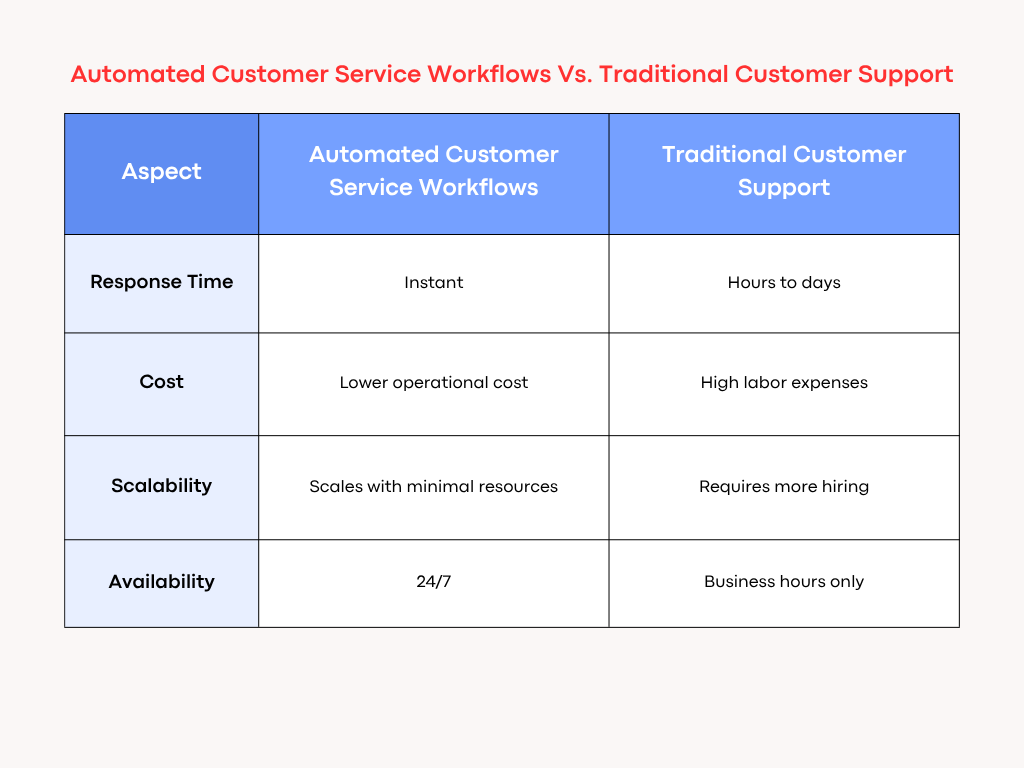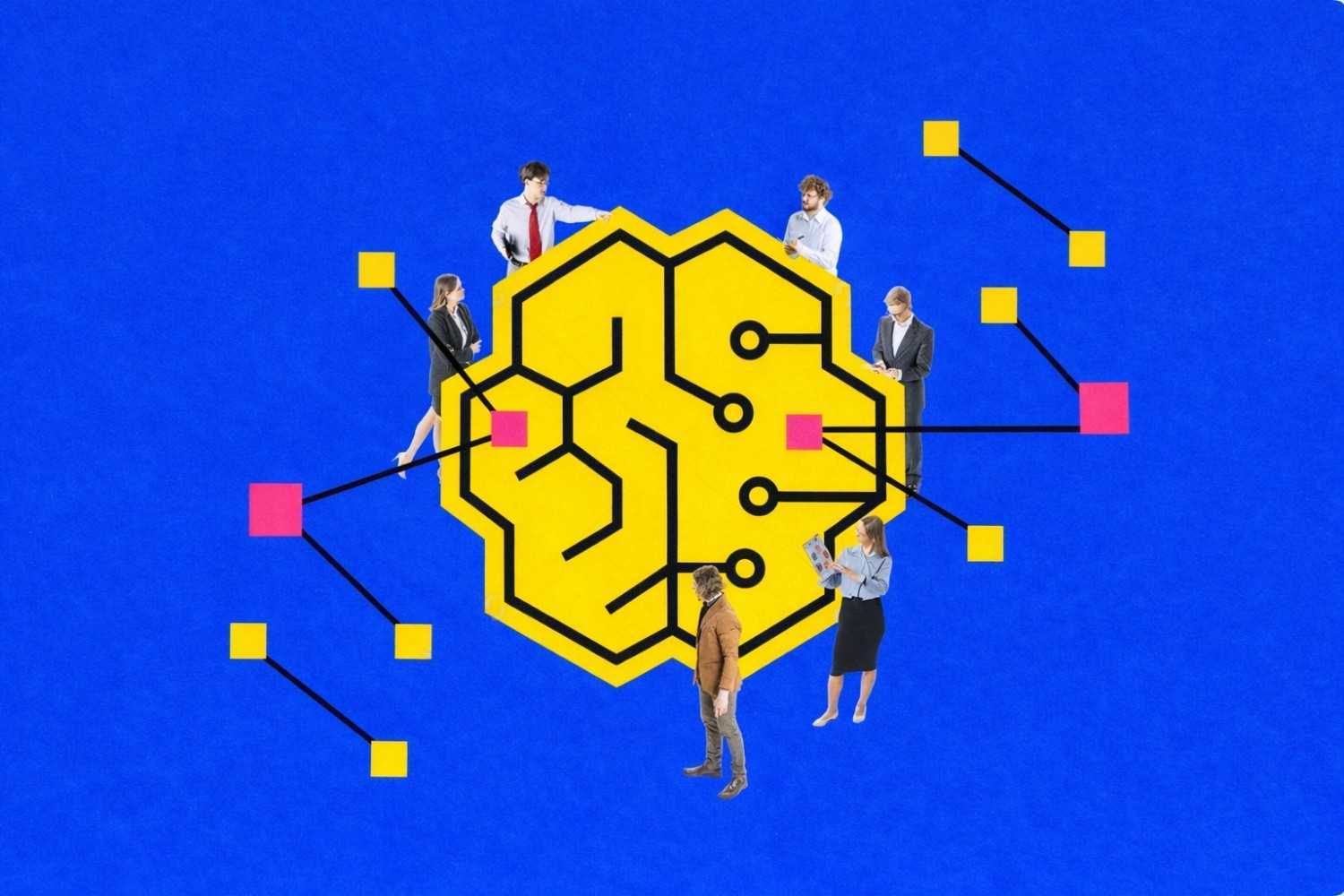Automated Customer Service Workflows for Businesses

In today’s fast-paced digital world, customers expect instant responses and 24/7 support. Traditional customer service models, which rely heavily on human agents, often struggle to meet these growing demands due to limited availability, slower response times, and higher operational costs.
To stay competitive, more businesses are shifting to AI-powered automation, creating streamlined customer service workflows that enhance efficiency and improve the customer experience. This shift allows companies to deliver faster, more personalized support while reducing operational strain.
What Are Automated Customer Service Workflows?
Automated customer service workflows are step-by-step processes that use AI, chatbots, and other automation tools to handle simple and repetitive tasks like answering common questions, sending updates, or directing customer requests to the right person without needing a human to do it. These workflows help businesses respond faster, save money, and give customers a smoother and more convenient experience. To understand how automation impacts overall business operations, check out our guide on AI automation and its workflow impact on businesses.
Key Components:
AI Chatbots
AI chatbots respond instantly to common customer questions, providing quick and accurate answers any time of the day. They can handle multiple conversations at once, ensuring no customer is left waiting for support. Discover how agentive vs. agentic AI shapes the way chatbots interact with customers.
Ticket Routing
Ticket routing automatically sends customer requests to the right team member who can best handle the issue. This reduces delays and ensures that customers get the right help faster. Businesses ready to scale can explore 5 signs your business is ready for automation to see if they should implement tools like automated routing.
Email Automation
Email automation sends important updates, confirmations, and follow-up messages without someone having to do it manually. It saves time and makes sure customers always receive timely information. Learn how business process automation services can take email communication and workflow efficiency to the next level.
CRM Integrations
CRM integrations connect customer information in one place, making it easier for support teams to provide personalized help. This helps businesses build stronger relationships with customers by remembering their needs and preferences. Modern solutions, such as a no-code AI agent builder for business teams, make integrating CRM systems with AI tools faster and easier.
For companies in industries like manufacturing or logistics, integrating these workflows with AI in industrial automation can further enhance customer support and operational efficiency.
Automated Customer Service vs. Traditional Customer Support
Traditional customer support relies heavily on human agents to handle every customer interaction. While this approach offers a personal and empathetic touch, it can be slower, more expensive, and challenging to scale as demand grows. Long response times and limited availability, such as operating only during business hours, can lead to customer frustration and lower satisfaction. According to Mckinsey & Company,
“AI-enabled customer service is now the quickest and most effective route for institutions to deliver personalized, proactive experiences that drive customer engagement.”
Automated customer service workflows, on the other hand, leverage AI-powered tools to provide faster responses, reduce operational costs, and deliver consistent service around the clock. These workflows can handle multiple requests simultaneously, ensuring that customers receive quick and accurate answers without waiting in long queues. By taking care of repetitive tasks like ticket routing, FAQs, and follow-ups, automation frees up human agents to focus on more complex and high-value interactions.
Below is a quick comparison of traditional support versus automated workflows:

When to Combine Traditional and Automated Support
While automation delivers speed, cost efficiency, and 24/7 availability, there are moments when human agents are still essential, especially for complex, sensitive, or emotionally charged issues that require empathy and critical thinking. The most successful businesses use a hybrid approach, combining automated workflows for routine tasks with human agents for high-value interactions. This balance ensures customers enjoy both the convenience of instant responses and the personalized care that only real people can provide.
Explore more insights on our AI automation blogs.
Pros and Cons of Automated Customer Service Workflows
Pros:
24/7 availability and faster replies.
Automated systems can handle inquiries at any time, ensuring customers receive immediate responses even outside business hours. This helps improve customer satisfaction by reducing wait times and providing round-the-clock assistance.
Lower operational costs with fewer repetitive tasks.
Automation reduces the need for large customer service teams by taking over routine tasks like answering FAQs or sending updates. This allows businesses to allocate their resources more effectively and save money on staffing.
Data-driven analytics for insights on customer behavior.
AI-powered workflows collect and analyze data from customer interactions to identify trends and pain points. These insights help companies improve their products, services, and support strategies.
Scalability without increasing headcount.
As customer inquiries grow, automated systems can easily handle higher volumes without hiring additional staff. This makes it easier for businesses to expand operations while maintaining consistent service quality.
Improved consistency and accuracy.
Automated workflows deliver standardized responses and minimize the risk of human error, ensuring customers receive accurate information every time.
Better resource allocation.
With automation handling repetitive tasks, customer service teams can focus on high-value tasks, such as resolving complex issues and building stronger customer relationships.
Cons:
Limited human touch for complex cases.
AI systems may struggle to provide the empathy and nuanced understanding required for sensitive customer issues.
Requires careful setup and ongoing testing.
Automation needs continuous optimization to ensure workflows stay accurate and effective.
Risk of poor customer experience if workflows lack proper escalation.
Without a smooth handoff to human agents, customers can become frustrated with unresolved issues.
How MergePoint AI Enhances Automated Customer Service Workflows
MergePoint AI stands out as a powerful solution for modern businesses looking to streamline customer service through automation. With its no-code AI workflow builder, companies can design and launch fully customized workflows without needing developers or technical expertise. This allows businesses to save time, reduce costs, and quickly adapt their customer support strategies as their needs evolve.

Key Advantages:
AI-powered chatbots and ticket routing for faster resolutions
MergePoint AI’s advanced chatbots can instantly respond to customer inquiries, while automated ticket routing ensures requests are sent to the right team member, reducing delays and improving efficiency.
Seamless integrations with CRMs, Gmail, Slack, and other business tools
The platform integrates effortlessly with popular business applications, allowing customer data and communications to flow seamlessly between systems for a unified support experience.
Customizable workflows tailored for B2B, SaaS, and e-commerce industries
MergePoint AI enables businesses to create workflows that fit their specific industry needs, ensuring every process is optimized for maximum impact and customer satisfaction.
Proven success in logistics, finance, and SaaS sectors
Companies across multiple industries have already improved response times, reduced operational costs, and scaled their support operations with MergePoint’s automation capabilities.
Easy scaling as your business grows
Whether your business handles hundreds or thousands of inquiries per day, MergePoint AI grows with you, ensuring your automated workflows stay efficient and reliable.
Schedule a demo with MergePoint AI to see how you can automate your workflows and transform your customer service.
Steps to Create an Automated Customer Service Workflow
- Map out your customer journey and identify pain points.
- Find repetitive tasks that can be automated.
- Leverage MergePoint AI for no-code setup and testing.
- Define triggers and escalation paths for seamless responses.
- Test and optimize for continuous improvement.
FAQs on Automated Customer Service Workflows
Q1: Can automated workflows replace human agents?
Not entirely. They handle repetitive tasks while humans focus on complex and personalized interactions. Automated workflows act as a support system, reducing the workload on human agents and allowing them to focus on tasks that require empathy or critical thinking. By combining automation with human expertise, businesses can deliver a balanced and efficient customer service experience.
Q2: How do automated workflows improve customer satisfaction?
By providing fast, consistent, and accurate responses, leading to better customer experiences. Customers don’t have to wait long for answers, and automated systems ensure they receive reliable information every time. This consistency builds trust and enhances overall brand reputation.
Q3: What industries benefit most from automated workflows?
E-commerce, SaaS, finance, logistics, and B2B companies gain the most due to high customer interaction volume. These industries often deal with repetitive questions or transactions that automation can handle efficiently. Automation also helps businesses in these sectors scale their operations without compromising service quality.
Q4: Why choose MergePoint AI for customer service automation?
Because it combines no-code workflow building, AI-driven automation, and seamless integration, tailored for modern businesses. MergePoint AI is designed to be user-friendly, so teams can quickly build and customize workflows without technical skills. Its proven success across industries makes it a trusted solution for scaling customer support.
Q5: Is it difficult to set up automated customer service workflows?
Not at all. Platforms like MergePoint AI are built with a no-code interface, making setup easy even for non-technical teams. With pre-designed templates and seamless integrations, businesses can launch their workflows quickly and start seeing results in days, not weeks.
Q6: Are automated workflows cost-effective for small businesses?
Yes, they can significantly reduce the need for hiring additional customer support staff. Even small businesses benefit from lower operational costs and improved efficiency, enabling them to scale without spending heavily on resources.
In A Nutshell
Automated customer service workflows are no longer optional - they are a strategic advantage for businesses committed to delivering exceptional, round-the-clock support. By leveraging AI-powered automation tools like MergePoint AI, companies can reduce operational costs, improve response times, and create a more seamless customer experience. These intelligent workflows not only take care of repetitive tasks but also free up support teams to focus on high-value, personalized interactions that require human insight and empathy.
As digital transformation accelerates, businesses that adopt automation early are better equipped to meet rising customer expectations, scale efficiently, and maintain a competitive edge in their industry.
Start building your first automated workflow with MergePoint AI by scheduling a demo today.





